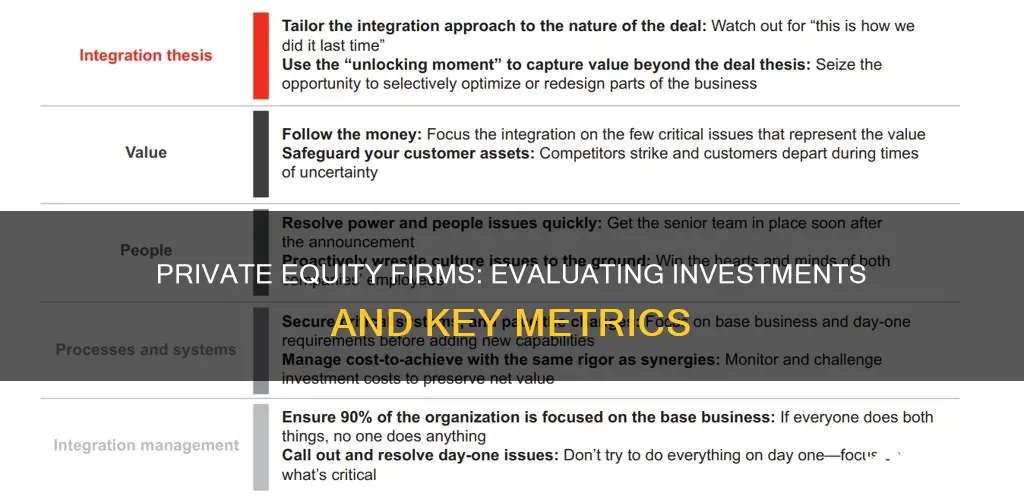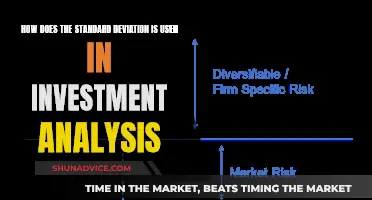
Private equity firms are investment partnerships that buy and manage companies before selling them. They are known for their aggressive use of debt, concentration on cash flow and margins, freedom from public company regulations, and hefty incentives for operating managers. When evaluating investments, private equity firms consider a company's financials, market position, industry trends, and debt financing available. They also conduct extensive due diligence to ensure they are making a sound investment.
There are three main types of private equity investment strategies: venture capital, growth equity, and buyouts. Venture capital involves investing in promising startups or early-stage ventures, while growth equity focuses on established, growing companies. Buyouts, on the other hand, involve investing in mature companies by purchasing them outright or acquiring one of their divisions.
When evaluating potential investments, private equity firms use various methods to determine a company's value. This includes analysing financial performance, market trends, and comparing the company to similar companies or assets that have been sold or are publicly traded.
Overall, private equity firms look for companies with strong market positions, sustainable competitive advantages, multiple avenues for growth, stable and recurring cash flows, low capital expenditure requirements, and favourable industry trends. By acquiring and overhauling these companies, private equity firms aim to earn profits when the businesses are sold.
| Characteristics | Values |
|---|---|
| Fund size | Mega funds (> $15B), upper middle market (> $5B), middle market, lower-middle market |
| Investment size | $200mm minimum, $200-$500mm per investment |
| Industry focus | Technology, consumer, SaaS |
| Investment structure | Buyout, preferred securities, debt |
| Performance | Fundraising trajectory, CalPERS database |
| Organizational aspects | Attrition rate, leadership focus, co-invest and carry compensation |
What You'll Learn

Fund size and investment size
Fund size is a crucial consideration for private equity firms when evaluating investments. The size of the fund determines the types of companies the firm will target and influences the level of competition during the buying process. Private equity firms can be categorised based on their fund size:
Mega Funds
Mega funds are the largest investment managers, typically managing funds greater than $15 billion. Examples include KKR, Blackstone, Carlyle, and TPG. With such substantial financial resources, mega funds can deploy more than $1 billion of equity into a single investment. This scale enables them to target large public companies and take them private.
Upper Middle Market
The Upper Middle Market consists of funds with sizes typically above $5 billion. Examples include Berkshire Partners, American Securities, and ABRY. These funds usually invest between $200 and $500 million per investment, allowing them to explore PIPE investments in smaller public companies or Series D/E type investments.
Middle Market and Lower-Middle Market
Funds with sizes below the Upper Middle Market threshold fall into the Middle Market and Lower-Middle Market categories, with less distinct boundaries between them. The Lower Middle Market may include companies with less than $50 million in annual revenue.
There is often a blend between Middle Market and Growth Equity investing, with the former focusing on cash flow-oriented businesses and the latter targeting revenue and growth-oriented companies.
Portfolio Companies
On average, funds hold between 10 and 20 portfolio companies, indicating a direct relationship between fund size and investment size. For instance, Onex Partners, with a fund size of $7.15 billion, has stated a minimum investment size of $200 million, suggesting a maximum of around 35 portfolio companies.
The number of companies a private equity firm can manage is directly proportional to its team size. Therefore, the investment size and number of portfolio companies are crucial factors in the evaluation process.
Investment Structure
Private equity firms employ various investment structures, with traditional buyout being the most common. This involves acquiring entire companies or taking a controlling stake. However, some firms specialise in distressed investing, targeting companies facing financial challenges or mismanagement. These firms aim to acquire undervalued companies, implement improvements, and sell them for a profit.
Fund Return and Growth
When evaluating a private equity firm, it is essential to consider its recent financial performance and growth trajectory. One indicator is the ability to raise larger funds over time. A decrease in fund size over successive funds may suggest poor performance or a loss of investor confidence.
Investment Firms: Are They Worth Your Money?
You may want to see also

Industry trends and market position
When evaluating potential investments, private equity firms will consider a company's market position and industry trends. This involves understanding the company's value proposition, market position, historical performance, and industry trends to assess its ability to achieve its forecasted projections.
A strong market position is characterised by high barriers to entry, high switching costs, and strong customer relationships. Private equity firms seek companies with sustainable competitive advantages and diverse growth strategies. They also look for stable, recurring cash flows with low exposure to seasonal and cyclical fluctuations, indicating a company's ability to service debt requirements.
Firms will also assess industry trends to identify companies well-positioned to benefit from them. Examples of favourable industry trends include increasing automation, changing customer habits, adoption of disruptive technologies, digitalization, changing demographics, and increasing regulation.
Due diligence is a crucial part of the investment process, where private equity firms perform a detailed investigation to ensure a sound investment. This includes commercial, financial, and legal due diligence. Commercial due diligence focuses on understanding the company's value proposition, market position, historical performance, and industry trends. Financial due diligence confirms the accuracy of financial information and helps firms understand the unique dynamics of the company's financial reporting. Legal due diligence confirms that the target company is not subject to any future liabilities, including regulatory issues and lawsuits.
Overall, private equity firms evaluate market position and industry trends to identify companies with strong market positions, diverse growth strategies, stable cash flows, and the potential to benefit from industry trends. They also conduct extensive due diligence to ensure a sound investment.
Creating Cash Flow: Investment Strategies for Success
You may want to see also

Financial performance
When evaluating investments, private equity firms pay close attention to the financial performance of a company. This analysis is crucial for making informed investment decisions, ensuring compliance with regulations, and effectively managing their portfolios. Here are some key aspects of financial performance that private equity firms consider:
Historical and Projected Financial Performance
Private equity firms scrutinize a company's historical financial data to assess its past performance and stability. This includes reviewing financial statements, budgets, and key performance indicators (KPIs). They also evaluate the company's projected financial performance by analyzing its financial model, growth assumptions, margin expectations, and risk factors. This analysis helps them understand the company's ability to achieve its forecasted projections.
Quality of Earnings
Private equity firms focus on evaluating the quality of a company's earnings by excluding non-recurring costs and expenses. They hire accountants to ensure the accuracy of financial information and adjust the earnings to reflect the true financial health of the company. This adjusted EBITDA (earnings before interest, taxes, depreciation, and amortization) is critical for valuing the company and determining the purchase price.
Stable and Recurring Cash Flows
Stable and recurring cash flows are highly desirable for private equity firms, especially in highly leveraged transactions. They seek companies with consistent cash inflows that can cover debt servicing and other financial obligations. Companies with low exposure to seasonal or cyclical fluctuations in cash flows are more attractive as they provide a more predictable source of cash.
Capital Expenditure Requirements
Private equity firms prefer companies with low capital expenditure requirements as they offer more flexibility in capital allocation. Low capital expenditure allows management to invest in growth initiatives, make acquisitions, or return capital to shareholders. On the other hand, capital-intensive businesses typically receive lower valuations from private equity firms due to the reduced availability of capital and increased financial risk.
Debt and Debt-like Items
Private equity firms carefully analyze a company's debt and debt-like items, such as capital expenditures, accounts payable, and accrued expenses. They need to understand the total debt outstanding as it will impact the amount given to sellers during a transaction. Accurate assessment of debt is crucial for determining the cash available after a deal and ensuring that debt obligations are accurately represented.
Normal Working Level of Capital
Private equity firms assume that a company requires a normal level of working capital to remain in business and, therefore, exclude it from the purchase price. They assess the reported working capital, set a target working capital level, and perform due diligence to understand the unique dynamics of the company's cash flow, deferred revenue, orders, revenue recognition, and seasonality.
Tax Structure
Private equity firms also consider the tax structure of a company, including federal, state, local, and international tax obligations. They analyze historical and anticipated tax situations to optimize tax compliance and minimize liabilities. This analysis provides insights into methods for maximizing net profit and reducing tax burdens.
Financial Metrics and Performance Measures
Private equity firms utilize various financial metrics and performance measures to evaluate potential investments. These include the internal rate of return (IRR), multiple of invested capital (MOIC), and public market equivalent (PME). By applying these metrics, they can assess the speed of returns, total return, and how the investment compares to public market alternatives.
In summary, private equity firms conduct a thorough analysis of a company's financial performance by examining its historical and projected data, cash flow stability, debt obligations, working capital, tax structure, and various financial metrics. This financial evaluation plays a pivotal role in their investment decision-making process and portfolio management strategies.
Cash Equivalents: A Safe and Liquid Investment Option
You may want to see also

Investment structure
When people think of private equity, they often think of traditional buyouts, i.e. buying out entire companies and taking a controlling stake. However, private equity tends to involve a variety of different structures. Most private equity firms are relatively straightforward, with many mega funds sticking to either buyouts or some kind of preferred securities.
Some firms, however, are known for investing across the capital structure and even in debt. This kind of investing is sometimes called Special Situations, Distressed Investing, or Value-Oriented Investing. These private equity firms tend to look at companies that others ordinarily won't, such as those on the verge of bankruptcy or that are mismanaged. The goal of these private equity firms is to acquire companies at cheaper valuations and identify mispriced assets. These firms may invest using more complex securities to protect themselves in the case of downside.
Apollo is perhaps the most famous and successful firm that uses this investing strategy. They have consistently achieved stellar returns at the mega-fund level by investing in exotic and hard-to-understand situations. Centerbridge, Cerberus, and Searchlight are other notable players in this space.
As an associate, these firms tend to be significantly more complex and have a heavier focus on technical modelling. They also tend to have a higher technical standard when recruiting.
Investing Anonymously: Strategies to Invest Without an SSN
You may want to see also

Due diligence
Commercial Due Diligence
Commercial due diligence includes understanding the company's value proposition, market position, historical performance, and industry trends to assess the target's ability to achieve its forecasted projections.
Sample due diligence questions include:
- What is your competitive advantage? Is this a disruptive business model?
- What are the barriers to entry into the business, and what are the switching costs?
- Where does the company fit in the industry value chain, and how has the industry changed over the last five years?
- Who are your main competitors, and what is the biggest threat to your company?
- What is the market landscape, and how saturated is the market?
- What is the historical and projected growth of the market, and what is the total addressable market?
- What are the key macroeconomic drivers and trends of the business?
- Have there been any significant changes to the industry landscape, such as new entrants or consolidation?
- What are the regulatory concerns, and how might they adversely affect the business?
Financial Due Diligence
Financial due diligence confirms the accuracy of all financial information provided and helps PE firms understand the unique dynamics of the company from a financial reporting perspective. PE firms typically hire accountants and/or auditors to review the financials, operations, customers, markets, and tax issues in detail.
The main areas of financial due diligence include:
- Quality of earnings: Confirming historical earnings and adjusting for non-recurring costs/expenses, as this will affect the company's valuation.
- Management adjustments: Addressing compensation flexibility, especially in family-founded businesses.
- Business-related adjustments: Accounting for issues like inventory valuation, revenue recognition, and accrual/reserve reversals.
- Pro-forma adjustments: Considering the impact of recent acquisitions or divestitures on historical earnings.
- Debt and debt-like items: Calculating the company's total debt-like items, as they impact the amount given to sellers.
- Normal working level of capital: Determining adjustments to reported working capital and setting a working capital target.
- Tax structure: Analysing federal, state, local, and international tax situations, both historical and anticipated.
- Information technology: Reviewing IT systems to ensure a smooth transition and accurate financial and tax records.
- Human resources: Understanding the role of HR in payroll, state filing requirements, and income regulations.
Legal Due Diligence
Legal due diligence focuses on confirming that the target company is not subject to any future liabilities, including regulatory issues, lawsuits, and unusual contract provisions. It involves reviewing corporate filings, material contracts, property and equipment, human resources, health and welfare plans, and information technology.
In summary, due diligence is an extensive process that PE firms undertake to thoroughly evaluate potential investments. It covers a range of commercial, financial, and legal aspects to ensure that the investment is sound and aligned with the firm's strategy and criteria.
Using CPF to Invest in Shares: A Guide
You may want to see also







